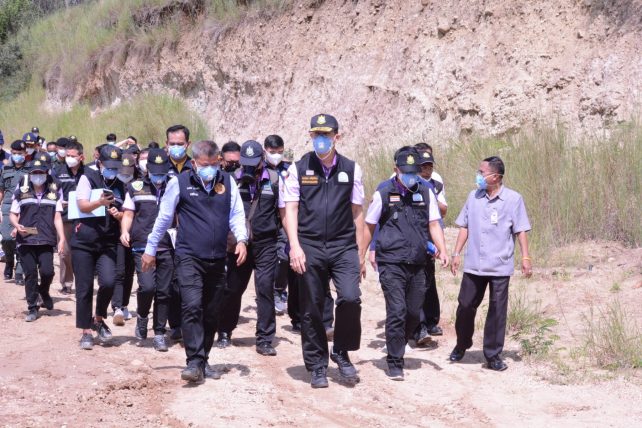
On 17 September 2021, the Environmental Protection Unit (EPU), Pollution Control Department (PCD) in collaboration with the representatives from Department of Industrial Work, Lopburi Province, Phanat Nikhom District, Internal Security Operations Command (ISOC), Natural Resources And Environmental Crime Division, Lopburi Provincial Industrial Office, Di Lang Subdistrict Administrative Organization, and Village Headman, Village 4 inspected the complaint case of illegal dumping of chemical wastes in private area, Di Lang Subdistrict, Phanat Nikhom District, Lopburi Province.
Mr. Athapol Charoenshunsa, Director General of PCD, revealed that the area where chemical wastes and unused materials (industrial wastes) were illegally dumped was a privately owned area with approximately 3 – 4 rai from a total area of 24 rai. It was found that 300 – 400 tanks of 200-liter chemical wastes or unused materials were dumped in the old soil pond. By the nature of the tanks detected, they were compressed until the sewage or unused material flooded the surrounding area. However, the physical characteristics of chemical wastes or some unused materials were classified as hazardous waste because they could ignite. The area where chemical wastes or unused materials were dumped was close to the pond that people living nearby have used. Moreover, it was found that water from this area leaked into the pond and caused damage and suffering to the environment and people.
Mr. Athapol said that in preliminary, EPU officer had already filed a complaint against the investigating officer of Phanat Nikhom Police Station in order to find the offender to be punished in accordance with the law. The illegal dumping of chemical wastes which are industrial wastes is considered an act that violates the law, including
1. The Factory Act, B.E. 2535 (1992) and its amendments is an offense of operating a factory group 3 without permission (Section 12) shall be liable to imprisonment for a term not exceeding two years, or a fine of not more than two hundred thousand baht, or both (Section 50).
2. The Hazardous Substance Act, B.E. 2535 (1992) and its amendments is an offense of possessing type 1 or type 2 or type 3 of hazardous substance without permission (Section 21, Section 22, Section 23), depending on what kind of hazardous substance is detected as industrial waste, shall be liable to a maximum penalty of not more than two years, or a fine of not more than two hundred thousand baht, or both (section 70 or section 71 or section 72 or section 73).
3. The Public Health Act B.E. 2535 (1992) and its amendments is an offense of collecting, transporting, or disposing of sewage or solid waste without permission (Section 19) shall be liable to imprisonment for a term not exceeding six months, or a fine not exceeding fifty thousand baht, or both (Section 71) and an offense of carrying out a business dangerous to health without permission (Section 33) shall be liable to imprisonment for a term not exceeding six months, or a fine not exceeding fifty thousand baht, or both (Section 71).
4. The Cleanliness and Orderliness Act, B.E. 2535 (1992) and its amendments is an offense of collecting, transporting, or disposing of sewage or solid waste without permission (Section 34/2) shall be liable to imprisonment for a term not exceeding six months, or a fine not exceeding fifty thousand baht, or both (Section 58/2).
5. The Enhancement and Conservation of National Environmental Quality Act, B.E. 2535 (1992), comprising of offenses of operating a project before the environmental impact assessment report has been approved by a committee of experts, shall be liable to a fine not exceeding one million baht and a daily fine of not exceeding one hundred thousand baht per day throughout the period of non-compliance or cessation of such action (Section 101/1), and must pay for damages or expenses if damage occurring to private property or there is damage to natural resources and the environment (Section 96 and Section 97).
The resulting impact has made soil, water resources and groundwater contamination which must enforce the law for litigation and rehabilitation by using the law in accordance with the authority of the relevant agencies and will prosecute for both civil and criminal laws. If anyone sees the illegal dumping of chemical wastes in the area of Di Lang Subdistrict, Phanat Nikhom District, Lopburi Province, we ask for cooperation to report the clues to the Environmental Protection Unit (EPU), which will work with the relevant agencies to track and enforce the law on the facility owner of Illegal chemical waste dumping and related pollution sources, Mr. Athapol said.